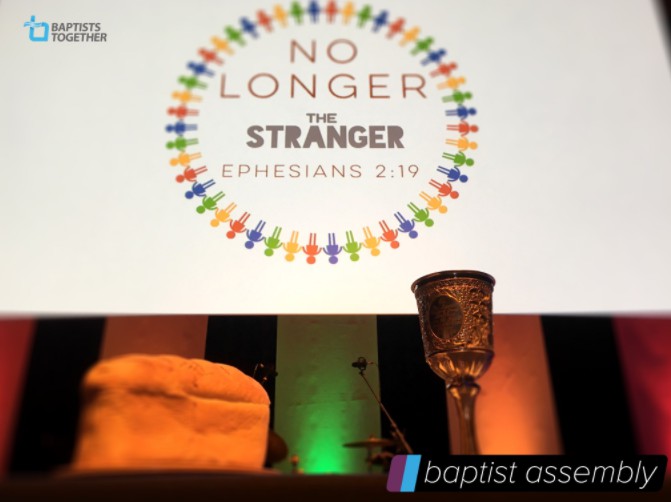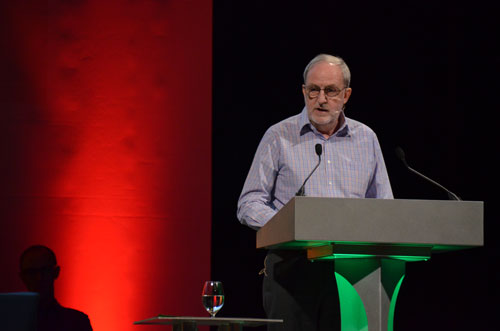Forgiveness, restoration, inclusion
The cross of Jesus Christ is multi-faceted, bringing not just forgiveness but restoration and inclusion for all, said David Kerrigan during the communion service on Sunday morning

David preached during the Sunday morning communion service at the Harrogate Convention Centre.
He urged delegates to listen carefully to the familiar communion words ‘whenever you eat this bread and drink this cup, you proclaim the Lord’s death until he comes.’
'Proclaiming the Lord’s death' are strong words, David said. There is a direct connection being drawn between this celebration of communion, and the cross upon which Jesus died.
Unpacking the nature of that connection, he said the cross is similar to a diamond in the way the latter breaks up light to reveal different colours at each turn. As a diamond has multiple facets, so does the Cross.
Highlighting three of those facets, he challenged delegates to present them as best they could. ‘If we don’t, then we do not do justice to all that it (the cross) contains.’
The first facet is forgiveness, ‘the most prominent facet of the cross, the very core of the gospel.’ David said he had known people who have stayed away from communion because they felt they were not worthy to receive the bread and wine.
'The irony is that that is the very point, no-one is worthy, and that’s precisely why they should come.'
However, we sometimes stop at forgiveness, David continued. The cross goes further: it’s also a place of complete healing. That’s the second facet he chose to highlight.
Everyday, we cross paths with people who are broken – people whose dreams have not materialised, or whose marriages have failed or are failing, or whose debts have piled up and their lives have spiralled out of control, and they’ve turned to drink and drugs.
We cross paths with families with children with special needs, who though they are loved to bits and are truly special lives, ‘in the quiet hours of the night, many a tear will fall as mums and dads confess with honesty that this is not a path of their choosing.’

And, David continued, I doubt there are many families represented here who are not touched by the reality of caring for people who were once strong and capable, but are now weak and struggling.
Is there good news for broken people? Have we more to say than the cross is a place of forgiveness?
Well, here is ‘where the scriptures cry out to be heard,’ said David, quoting Psalm 38:18, Psalm 147:3, and Matthew 11:28.
‘The cross is also a place where broken people can be restored and healed,’ he said. ‘And today’s world desperately needs to know the invitation to draw close that cross.’
And there’s more, he continued. He had taken Ephesians 2: 13-22 and Deutoronomy 10: 17-22 as his texts.
‘The verses we read earlier express something that is a precious facet of our faith that is too rarely heard but is urgently needed in today’s world… our course from estrangement to family membership:
-
Deut 10:19 You shall also love the stranger, for you were strangers in the land of Egypt...
-
Eph 2:19 So then you are no longer strangers and aliens, but you are citizens with the saints and also members of the household of God…
Inclusion is therefore the third facet of the cross - and we need to find every opportunity to model it, David said. We need to both to welcome those who are left out, and speak on behalf of those whose exclusion is somehow enforced by unjust structures within society.
We will be acutely sensitive to cases of unfair exclusion; or those fleeing war and persecution and seeking refuge, and we will surely be concerned that, irrespective of our political views, we seem unable to fund our schools and our NHS while wealth of ‘almost unspeakable proportions is generated daily.’
David said these are political factors, not party political. When we vote, we must see the possibility of creating a just world, where people belong regardless of their ethnicity, their faith, their sexuality, their economic status, their postcode or their education.
‘All are welcome in God’s eyes.’
Concluding, he invited delegates to share a meal together.
‘And in so doing, let us proclaim the Lord’s death:
-
let that proclamation speak of forgiveness for sinful people
-
let that proclamation speak of restoration for broken people
-
let that proclamation speak of inclusion for isolated people
Baptist Times, 14/05/2017